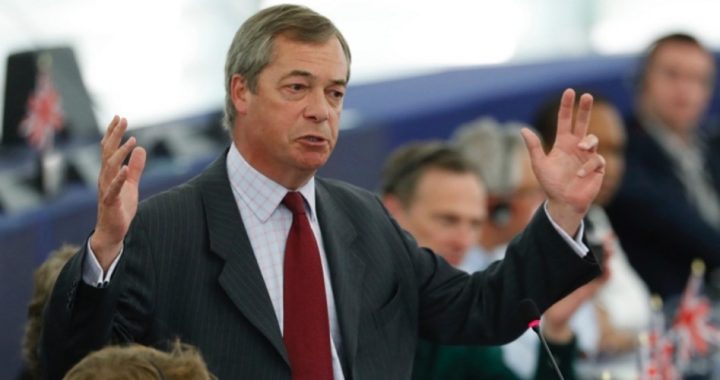
Podcast: Play in new window | Download ()
Subscribe: Android | RSS | More
Nigel Farage, the founder of the new Brexit Party in Great Britain and a vocal supporter of a no-deal British exit from the European Union, has announced that he will run for Parliament whenever the next general election in the U.K. occurs.
Farage is currently serving as a member of the European Parliament (MEP) for South East England and has been since 1999. Given his disdain for the U.K.’s involvement in the EU, that may sound odd, but Farage has gained fame for his speeches in the EU Parliament, which ridicule the body’s existence and lust for tax dollars.
Farage left the Conservative Party in 1992 after its support for the signing of the Maastricht Treaty, which entwined Great Britain into what would ultimately become the European Union.
Farage declined to say which district he was running in, but said, “of course I’ll stand. I will lead the charge on behalf of the Brexit Party.”
Begun by Farage in February of this year, the Brexit Party has already become a significant player in U.K. politics, having won 29 of the 73 U.K. seats available in European Parliament — the most of any party in the U.K. The Labour and Conservative parties — the two main political parties in the U.K. — only won 10 and four seats, respectively, though the Conservatives did not actively contest the election owing to Brexit uncertainties.
A general election is expected sometime in the next several months in an attempt to calm the chaos that has become British politics. Conservative Boris Johnson took over as prime minister in July of this year after the ineffective Theresa May’s resignation.
After the passing of the “Benn Bill,” which prohibited Johnson from threatening a no-deal Brexit as a bargaining chip in negotiations with the EU, Johnson immediately called for a snap general election to cure the parliamentary stalemate. Labour leader Jeremy Corbyn — who had been begging for a general election for two years — nixed the idea, possibly thinking that a loss could lead to a popular call for a no-deal Brexit.
An election seems imminent, but Remainers wish to postpone it until after the current October 31 “leave” deadline, pushing the U.K.’s membership in the EU until at least early 2020.
Farage has offered cooperation to Johnson, saying that the Brexit Party will only contest Labour seats in districts that have a heavy “Leave” contingent, but thus far, Johnson has refused efforts to build a coalition with the Brexit Party. “The Conservative Party is the oldest and greatest political party in the world, it’s a big, broad church and we don’t do deals with other parties.”
Of course, that’s not entirely true as, in Theresa May’s government, the Tories had governing agreements with Northern Ireland’s Democratic Unionist Party (DUP) and the Liberal Democrats going back five years.
But regardless of Johnson’s stance, Farage’s olive branch remains extended, providing that a no-deal Brexit remains firmly on the table. In an ad for the Brexit Party, Farage wrote, “As the Conservative conference opens, there are really only two Brexit choices: a clean break or a bad deal. Anything less than a Clean-break Brexit would betray 17.4 million Leave voters.”
And Farage believes that a coalition between the Tories and the Brexit Party is the simplest solution to get Brexit over and done with. “Here is a way for Boris to get a big, workable majority. We’re happy to help with that.”
“We’re the party that believes in a clean-break Brexit, because that’s the only way we can honor the referendum, and we’ve said that if Boris Johnson’s party goes for a clean-break then of course, we ought to have a non-aggression pact.”
Farage believes that such a coalition could generate a very large governing majority for Johnson. “Actually, if that did happen, Johnson would win a very big parliamentary majority,” Farage said. The leader of the Brexit Party estimated that Johnson would “have a majority of 60 to 100 seats.”
Of course, that’s up to the voters of Great Britain. But a recent poll indicates that Labour Party members who favor leaving the EU are more likely to back the Brexit Party than a Conservative Party, which has sold them out before.
Their historical disagreements aside, Farage seems to be offering Johnson a lifeline as he struggles against the roiling sea that is Brexit in British politics. It might be prudent for Johnson to grab the lifeline and work out the specifics once he is safe and dry.
Photo: AP Images




